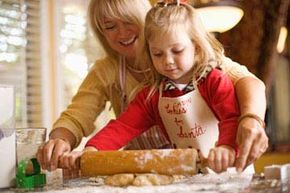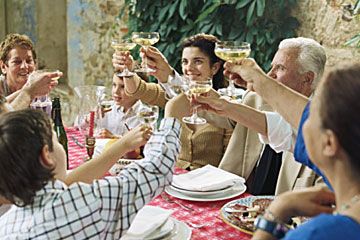If this is the year your children refuse to don matching pajamas for a heart-shaped-pancake feast on Valentine's Day, all is not lost. Family traditions -- even those the kids don't fully embrace -- offer lifelong benefits.
Family rituals build powerful interpersonal connections and foster a collective sense of identity. Take your annual family ski vacation, for example. Children relate their mountainous tales all year long. They browse through vacation photos and trigger family conversations. This positive cycle promotes interest in next year's trip.
Advertisement
Family traditions also allow the older generations to pass along their values. For instance, a family that volunteers to serve meals at a homeless shelter on Thanksgiving asserts the importance of helping others. And continuing the tradition year after year adds a sense of predictability that children relish -- even if they sometimes complain along the way.
If your children threaten to boycott your favorite traditions, cut to the chase. Explain how the tradition began and why it's important to you that it continues -- even if it's not how they want to spend their spare time.
The more a child is involved in a tradition, the more meaningful it will become. So, if you happen to feel a nostalgic nudge to whip up a batch of bohne beroggi (German Mennonite pastries filled with sweetened bean filling, drizzled with icing and served warm), get the kids involved. They can measure and stir ingredients, and then taste the fruits of their labor. All the while, you can share memories of baking the treats with your relatives. Pairing the information with a rewarding activity makes it more fun for your children to learn your family's distinctive history.
If you still have some reluctant participants, encourage your kids to put their own twist on a time-honored tradition -- like watching a family movie marathon and eating popcorn for luck on New Year's Day instead of (or in addition to) serving black-eyed peas. Or have them start their own family rituals. Plan a summer of Water Wednesdays where you go swimming, visit a water park or run through the sprinklers. Start the school year with Fun Fridays and play at the park, visit a museum or complete a craft project -- whatever entertains your family.
Negotiation about traditions strengthens a family. When your children share their opinions about family rituals (including what they do or don't like), they set healthy boundaries. Plus, compromising gives family members an opportunity to support one another's goals, even in the absence of complete consensus. Around the age of 4 years, a child's cognitive and emotional development begin to allow them to see from another person's perspective, a skill that's fostered during ongoing adaptations of family traditions. Older children -- who often gravitate away from the family unit because of social demands -- benefit from the continuity.
The next time you have an idea about matching pajamas or mixing bowls, marshal the troops. Children may protest about family activities, but then, that's tradition, too.
Advertisement



